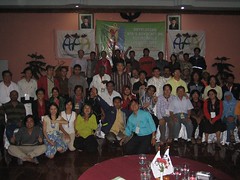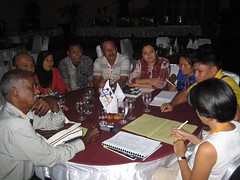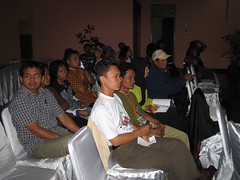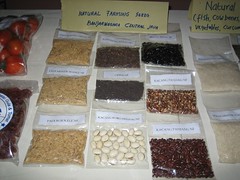 An event entitled “Seminar-Workshop on Developing AFA’s Advocacy on Sustainable Agriculture†was held in Kusuma Agrowisata Hotel, Batu City, Malang, Indonesia last September 11-17, 2006. The event was hosted by Aliansi Petani Indonesia or API (AFA’s member in Indonesia) and Bina Desa, API’s strategic NGO partner.
An event entitled “Seminar-Workshop on Developing AFA’s Advocacy on Sustainable Agriculture†was held in Kusuma Agrowisata Hotel, Batu City, Malang, Indonesia last September 11-17, 2006. The event was hosted by Aliansi Petani Indonesia or API (AFA’s member in Indonesia) and Bina Desa, API’s strategic NGO partner.
The seminar-workshop resulted in a draft outline of AFA’s concept paper on advocating mainstreaming sustainable agriculture in Asia. AFA also identified good SA practices from the experience of its members, strategies for promoting SA with their respective national governments, and roles of AFA members, the AFA regional network, and its partners in promoting SA. Immediate action points at the local, national, and regional levels were also agreed upon.
Thirty-five participants, composed of farmer leaders and their staff and translators, attended the event, which included a field visit to Tlego Makmur, one-night home stay with API farmers, and a workshop consisting of a panel discussion on APIâ€s advocacy and on AR and SA, members’ presentations on their SA initiatives, and inputs from resource persons from VECO and Swiss Contact.
and their staff and translators, attended the event, which included a field visit to Tlego Makmur, one-night home stay with API farmers, and a workshop consisting of a panel discussion on APIâ€s advocacy and on AR and SA, members’ presentations on their SA initiatives, and inputs from resource persons from VECO and Swiss Contact.
In his welcome speech, API Chairperson Sambito expressed his gratitude for the presence of all seminar-workshop participants and his hope for a fruitful exchange among farmers especially during the visit to the village.
 The farmer organizations present were KAFF (Korea), SorKorPor (Thaialnd), PAKISAMA (Philippines), API (Indonesia), TWADA (Taiwan), FNN (Cambodia), VNFU (Vietnam), and Farmers’ Dairy Cooperative (Malaysia).
The farmer organizations present were KAFF (Korea), SorKorPor (Thaialnd), PAKISAMA (Philippines), API (Indonesia), TWADA (Taiwan), FNN (Cambodia), VNFU (Vietnam), and Farmers’ Dairy Cooperative (Malaysia).
In AFA’s framework, sustainable agriculture (SA) is defined as a farming system that adheres to the following principles: Ecologically Sound (application of farming technologies and systems that preserve and enrich the natural resource base; friendly to environment); Economically Viable (farmers are encouraged to do SA because they can earn more); Socially Just and Equitable (SA farming systems can only be successfully adapted by farmers if they are owners of the land they till and should empower and benefit the poor sectors of society and not only a  few people); Culturally Sensitive (should respect and incorporate existing indigenous systems of agriculture, food consumption and nutritional patterns of the people); Promotes Appropriate Technology (technology should fit the farm, the soil and the climate among others); Based on Holistic Science (looks at the totality of all factors and parts that can affect a particular aspect in agriculture); and, Promotes Total Human Development.
few people); Culturally Sensitive (should respect and incorporate existing indigenous systems of agriculture, food consumption and nutritional patterns of the people); Promotes Appropriate Technology (technology should fit the farm, the soil and the climate among others); Based on Holistic Science (looks at the totality of all factors and parts that can affect a particular aspect in agriculture); and, Promotes Total Human Development.



Comments are closed